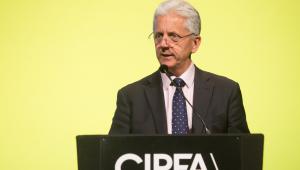A discussion on the finance professional of the future was told these roles would be defined by flexibility, increasing levels of automation and real-time reporting and be at the centre of organisational performance.
Mark Nitler, vice president of finance technology firm Workday, told the Manchester meeting that finance directors were responsible for transactions processing, governance and “business partnering where we add value”.
The time invested on these activities was though “upside down, much more time is spent on transactions than on business partnering” even though the later was what most professionals would wish to do.
He predicted: “The new role of the CFO will move from control to value added in the long-term.
“The bottom layer [of jobs] will go and jobs will change, with a focus on people skills, understanding technology and data, not on finance and accounting. The role will be to help managers understand how the organisation delivers its mission and the nature of trade offs in using money to do that.”
Betty Sturgeon, deputy director, people and capability at the Government Finance Academy, agreed saying: “We will need softer inter-personal skills in accountants so they can become partners.”
Paul Clarke, head of finance at the London Borough of Barnet, said public sector finance directors should expect to work in an environment with more engaged electorates, blurred boundaries between the physical and digital worlds and an “unmanageable rate of change”.
He said there would be more emphasis on operational budgeting, financial planning and input to organisational strategy, and less on reporting, compliance and budget management, all of which could be automated.
Canada’s assistant comptroller general Roger Ermuth told the meeting the role of finance professionals in his country’s government service had already changed, being less concerned with technical issues and having been accorded a higher status.
Cabinet papers now required the consent of finance chiefs before they may be acted upon and permanent secretaries have been made accountable to parliament for their department’s financial performance.











